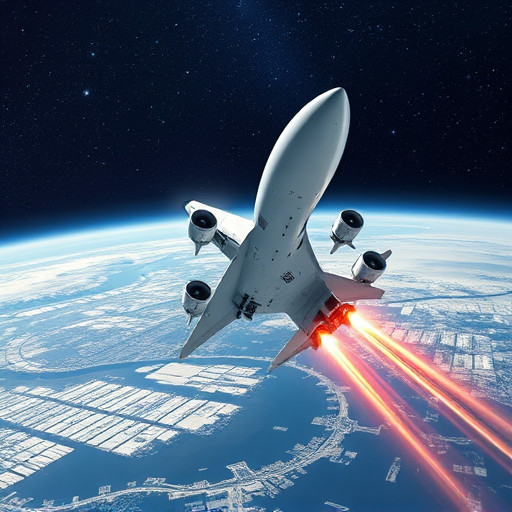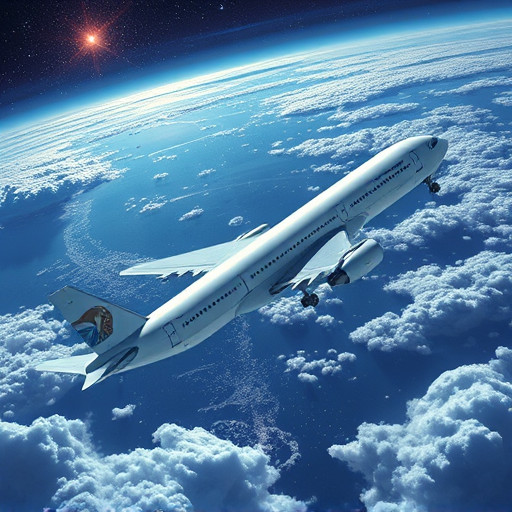Artificial Intelligence (AI) is transforming aerospace by improving safety and operational efficiency. AI algorithms analyze flight data, weather patterns, and maintenance records to predict component failures, reducing risk. It automates tasks like flight planning and trajectory optimization, minimizing human error and optimizing fuel consumption for cost savings and faster travel times. AI also powers advanced airport systems such as automated baggage handling and facial recognition, enhancing passenger experiences. With its ability to learn from real-world data, AI is paving the way for more autonomous aircraft and safer skies in the future.
Artificial Intelligence (AI) is revolutionizing the aerospace industry, transforming safety, efficiency, and design processes from end to end. This article explores AI’s multifaceted impact on aviation and space exploration. From automating routine tasks for enhanced safety through predictive analytics and real-time monitoring, to optimizing maintenance for reduced downtime, AI drives operational excellence. It also facilitates innovative design and development, personalizing aircraft based on specific mission needs. Looking ahead, AI promises to unlock new frontiers in hypersonic flight, space exploration, and sustainable aviation practices.
- AI's Transformative Role in Aerospace Safety and Efficiency
- – Automating routine tasks: Enhancing safety through predictive analytics and real-time monitoring.
- – Advanced flight simulation: Creating safer and more efficient training environments.
AI's Transformative Role in Aerospace Safety and Efficiency

Artificial Intelligence (AI) is transforming aerospace by significantly enhancing safety and operational efficiency. AI algorithms can analyze vast datasets from flights, weather patterns, and maintenance logs to predict component failures before they occur, minimizing the risk of catastrophic events. By automating complex tasks like flight planning and trajectory optimization, AI reduces human error and optimizes fuel consumption, leading to cost savings and faster travel times.
Furthermore, AI powers advanced systems for airport operations, such as automated baggage handling and facial recognition for passenger screening, streamlining processes and improving overall passenger experience. With its ability to learn and adapt from real-world data, AI is paving the way for more autonomous aircraft, promising safer skies and a new era of air travel efficiency.
– Automating routine tasks: Enhancing safety through predictive analytics and real-time monitoring.

AI is transforming aerospace by automating routine tasks and enhancing safety through predictive analytics and real-time monitoring. By taking over mundane and repetitive activities, AI frees up human resources to focus on more complex operations, leading to improved efficiency and reduced errors. Predictive analytics, powered by machine learning algorithms, can anticipate potential issues before they occur, enabling proactive measures to be taken. This includes identifying maintenance needs based on aircraft performance data or forecasting weather conditions that could impact flight safety.
Real-time monitoring capabilities further bolster safety by providing continuous updates on various parameters such as engine health, fuel levels, and structural integrity. This information allows for immediate responses to any anomalies, ensuring optimal flight conditions at all times. The combination of predictive analytics and real-time monitoring not only enhances the overall safety of aerospace operations but also contributes to more seamless and reliable air travel experiences.
– Advanced flight simulation: Creating safer and more efficient training environments.

Advanced flight simulation technologies powered by AI are transforming aerospace learning. These tools offer a safe and controlled environment for pilots to hone their skills without the risks associated with real-world flights. By recreating complex scenarios, from adverse weather conditions to system failures, AI-driven simulations provide an invaluable training ground.
This technology enhances efficiency in pilot training by allowing for repeated practice of challenging situations, enabling learners to improve at their own pace. Moreover, it allows instructors to personalize training programs based on individual student needs, optimizing learning outcomes and ensuring pilots are prepared to handle a wide range of aviation challenges.
AI is poised to dramatically transform aerospace learning. Through automating routine tasks and enhancing predictive analytics, safety can be improved while efficient flight simulations create realistic training environments. These advancements promise to make air travel safer and more accessible in the future.


